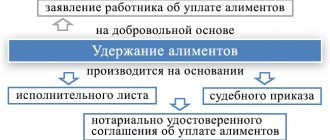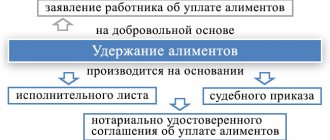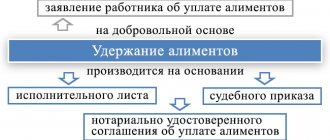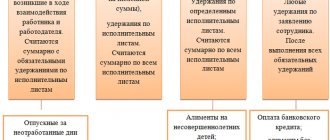How to dispute a utility debt? How to challenge a housing and communal services debt in court and pre-trial? This question often arises among our Principals.
Entering adulthood is associated with numerous responsibilities, one of them is paying utility bills; clause 3 of Art. obliges us to do this. 30 of the Housing Code of the Russian Federation, which states: “the owner of a residential premises bears the burden of maintaining this premises and, if this premises is an apartment, the common property of the owners of the premises in the corresponding apartment building.”
When is rent arrears taken to court?
The law does not establish the amount of debt for housing and communal services at which the management organization can sue. If the debt has accumulated over 2 months, but is at least partially repaid, the manager will probably not go to court to collect the debt for 2 months.
The manager can go to court if the debt is more than 6 months or more than a year. The main thing in this matter is for the manager to meet the limitation period, i.e. go to court before the expiration of 3 years.
Thus, rent arrears can be of any kind; what matters is how long it has accumulated and whether the debtor makes payments at least partially.
Errors in receipts due to the fault of the tenant/owner of the apartment building
Perhaps this is the most common type of error when calculating rent in an HOA/TSK, housing cooperative or management company.
Common causes of errors on the part of the owner or tenant of an apartment building are as follows:
1) Errors when submitting meter readings.
One incorrect figure in the IPU testimony provided by the tenant and the final figure in the receipt due for payment increases by hundreds, or even thousands of rubles!
Surely, dissatisfied residents called your accounting department, or maybe you personally, with indignation about large charges. But after checking, it turned out that it was all about the extra number.
Error when calculating housing and communal services:
Incorrect submission of IPU data
This error can only be avoided by more carefully checking the data submitted by service consumers (if the tenant has always consumed 2 m3 of hot water, but this month supplied 20 m3). Although this is not the responsibility of the accounting department or the heads of the HOA/TSN, housing cooperative or management company, it will help save time, nerves and loyalty of residents.
2) Meter malfunction, meter verification period has expired
The reasons for the malfunction of the IPU can be different - from a normal breakdown to failure due to too hot water.
We remember that the Housing Code of the Russian Federation establishes the following: the amount of payment for utilities is calculated based on the readings of metering devices, and in their absence, based on the consumption standards approved by the constituent entities of the Russian Federation (Part 1 of Article 157 of the Housing Code of the Russian Federation).
Error when calculating housing and communal services:
If the IPU is faulty, it will be a mistake to accrue according to the standard!
The procedure for calculating fees for utility services in the event of failure or loss of the IPU is regulated by subparagraph “a” of paragraph 59 of Rules 354.
This paragraph states: the average monthly readings of the IPU in calculating the cost of utility services are used if the utility metering device was used for at least 3 months before failure (for heating - at least 3 months during the heating period.
Average monthly readings of the IPU are used in calculations from the moment the device fails (if such a moment cannot be determined, then from the beginning of the billing period in which the malfunction was detected) and until the moment the metering device is put into operation, or until the expiration of 3 billing periods for residential premises ( 2 calculation periods for non-residential premises), during which the average monthly readings of the IPU were used in the calculations.
The calculation formula is established with reference to paragraph 42 of the Rules. And in this case, formula a(1) of paragraph 4 of Appendix 2 to the Rules applies:
in the i-th residential premises that are not equipped with an individual or common (apartment) metering device for cold water, hot water and electrical energy, if it is technically possible to install such metering devices in accordance with paragraph 42 of the Rules, it is determined by formula 4(1):
Pi = ni x Nj x Ksur x Tcr,
Where:
ni
— the number of citizens permanently and temporarily residing in the i-th residential premises; Nj is the consumption standard for the jth utility service;
Kpov
- increasing coefficient, the value of which in 2021 is taken equal to 1.4, and from January 1, 2021 - 1.5.
Tcr
— tariff (price) for a utility resource established in accordance with the legislation of the Russian Federation.
Attention:
from a literal reading of the above norm it follows that the number of billing periods during which the average monthly readings of the IPU are applied does not depend on the moment the application of such readings begins in the first billing period. That is, for example, if an IPU operated in a residential building fails in September, then the average monthly readings of the IPU are used in calculating utility fees for three billing periods - September, October and November. Calculations for October and November, of course, will be identical - the average monthly consumption volume determined by the IPU, multiplied by the tariff.
3) Failure to provide IPU evidence
If there is an individual, common (apartment) or room metering device, the consumer (owner or tenant) must take its readings monthly and transfer the received readings to the management organization no later than the date established by the agreement containing provisions for the provision of utility services.
Error when calculating housing and communal services:
Some specialists in the accounting department (in particular, the accounting departments of the management company) believe that in the event of non-delivery of meters, the calculation of housing and communal services must be carried out according to the standards established in a given subject of the Russian Federation. But this judgment is not correct and it would be a mistake to carry out calculations according to this principle.
If the consumer has not provided information about the meter readings in the apartment within the established time frame, then, in accordance with subparagraph “b” of paragraph 59 of Rules 354, the payment for utility services is calculated based on the calculation of the average monthly volume of consumption of the service for a period of at least 6 months. If the period of operation of the device was less than 6 months, then for the actual period of operation of the IPU, but not less than 3 months.
The calculation for the average monthly volume is made starting from the billing period for which the consumer did not provide meter readings, until the billing period (inclusive) for which the consumer provided the meter readings to the contractor, but no more than 3 billing periods in a row.
If after 3 months the consumer has not provided information about the IPU readings, then, in accordance with paragraph 60 of Rules 354, the calculation of housing and communal services is based on the standard. In this case, the increasing factor is not applied!
Who does the apartment debt apply to?
The responsibility to maintain the living space and pay utility bills lies primarily with the owner of the apartment.
However, in addition to the owner, other members of his family may live in the apartment. Capable and limited in capacity family members of the apartment owner bear joint liability with him for the obligations that arise in connection with the use of the premises, including obligations to pay for utilities. What does it mean? This means that the utility debt can be collected immediately from the owner and his family members, or from any one family member. As a rule, the debt is collected jointly and severally, and in the process of enforcement proceedings, whoever has money, including in accounts, will be retained by the bailiffs.
How to appeal a court order regarding utility payments?
If you find out that the court has issued a court order to collect utility bills from you, and even enforcement proceedings have already been initiated, do not panic ahead of time. Your task, if you do not agree with the court order, is to take measures to cancel it.
In order for the court to cancel a court order, it is necessary to apply to the court with a corresponding application to cancel the court order.
An important point in canceling a court order is that you did not receive the court order, or received it and sent an application for cancellation within 10 days. If you did not receive a court order, then you need to set out the circumstances of how you learned about it, namely, you got acquainted with the enforcement proceedings, learned about the initiation of proceedings based on the order on the FSSP website or in some other way. If you learned the information from the Internet (FSSP website), attach a screenshot to your application.
In the application, it is enough to indicate that you do not agree with the court order, and the court will cancel it.
PLEASE NOTE: even if the court order was issued several years ago, but you only learned about it now, feel free to apply to the court to have it cancelled. In judicial practice, there are cases when, for example, a debtor learned about a court order against him after 5 years and the court canceled it. Find out more about canceling a court order via the link and VIDEO on our website:
How to correctly write a complaint for incorrect calculation of payments
First you need to make sure that there really is an error on the receipt. To do this, you need to find out the current tariffs for utility services - perhaps they have recently been increased - and also check the information about the meter readings transmitted earlier: it may turn out that the consumer himself made an inaccuracy.
If you are convinced that there is an error in the receipt, you can file a complaint.
Appeal to the head of the management company
The leader must be interested in a peaceful resolution of the conflict, so it is necessary to contact him with a statement with the following content:
- Indicate the addressee's full name and position, for example, to the director of Management Company LLC, I.I. Petrov.
- Next, the initiator of the complaint indicates his data and address.
- Below in the center of the page is the name of the document - Complaint.
- Then the citizen must describe the problem in detail, indicate for which services and for what period the excess amounts were accrued, refer to the approved tariffs, and demand a recalculation.
- It would be useful to warn about the intention to apply for protection of rights to higher authorities if the issue is not resolved at this level.
- At the end, the date the document was drawn up and a signature are placed.
To the State Housing Inspectorate
A complaint of similar content is being drawn up.
They describe the details of the dispute, attach copies of receipts (it is advisable to confirm your good faith as a payer of utility bills and the absence of debts), documents confirming the right to use or own the apartment, a copy of the application and the response of the head of the company.
IMPORTANT! As a general rule, citizens' appeals are considered within 30 days.
Complaint to Rospotrebnadzor
After attempts to resolve the conflict, you should contact the head of the management company directly.
The application must include the correct, in the applicant's opinion, payment calculation with justification and a copy of the receipt, confirm the absence of debt for housing and communal services, attach a lease agreement or certificate of ownership, correspondence with the management company.
Nuances of a complaint to the prosecutor's office
Such content will have an appeal to the prosecutor's office. But, in addition to the main problem and providing evidence, the applicant must confirm the appeal to the relevant organizations: the housing inspection and Rospotrebnadzor.
The prosecutor's office not only considers the complaint on its merits, but also evaluates the legality of the actions or inactions of officials.
IMPORTANT! You can file a claim in court immediately, without contacting supervisory authorities, if you have evidence!
How to file a claim against the Criminal Code
A statement of claim against the management company demanding recalculation of incorrectly calculated rent must meet standard criteria:
- The header indicates the status of the court to which the case is being sent for consideration and its address,
- Below are detailed personal data of the initiator of the process: his last name, first name, patronymic, address, telephone.
- Next, you need to describe in detail the details of the opposite party: the full name of the management company, its legal and actual address.
- The main part describes the essence of the dispute. The plaintiff must also indicate attempts to resolve the conflict out of court. Then, with reference to paragraphs of regulatory documents that confirm the validity of his claims, the plaintiff demands recovery from the defendant of the amount of overpayment or recalculation.
- All documents confirming the applicant’s arguments are attached to the claim (a copy of the paper confirming the ownership of the residential premises, a receipt for payment of the state duty).
How to dispute utility debt?
- The first step is to file a claim demanding recalculation of the debt. The claim procedure must be followed for further legal proceedings.
- It would also be a good idea to submit an application to the housing inspectorate with a request to conduct an audit of the activities of your management company based on the accrual of utility bills.
- If the described options do not solve the problem, file a claim in court for debts on utility bills. How to challenge a housing and communal services debt in court? We submit an application for recalculation of the amount of debt, find out the date of the court hearing, make a calculation and defend it during the trial of the case.
This approach to the activities of management companies will definitely force them to work within the framework of the law, because an audit carried out can reveal numerous violations and impose a fine on the organization. We strongly recommend that you investigate the fact of illegal charges for utility bills, and not “feed” your management organization with money.
IMPORTANT: watch the video on the topic of recalculation of utility bills, disputes with management companies: advice from a lawyer on housing issues
Fines for incorrect calculation of fees for housing and communal services have been determined
Comments
Federal Law of December 31, 2017 No. 485-FZ “On Amendments to the Housing Code of the Russian Federation and certain legislative acts of the Russian Federation” defines the procedure for receiving and the amount of fines for incorrect calculation of fees for housing and communal services.
The above changes took effect on January 1, 2018 and are specified in paragraphs 11-13 of Article 156 and paragraphs 6-7 of Article 157 of the Housing Code of the Russian Federation.
Now the owner or tenant of the premises has the opportunity to receive some compensation for the fee if a violation of the procedure for calculating the amount of payment for the maintenance of residential premises or utilities is identified, resulting in an unreasonable increase in the amount of such payment.
As for the payment for residential premises , the management organization, homeowners' association, housing or housing-construction cooperative, or other specialized consumer cooperative, if a violation is detected, is obliged to pay the owner or tenant of the premises in an apartment building a fine in the amount of 50% of the amount of excess payment.
As for charging for utility services , the fine is paid by the person providing utility services, and the amount of the fine and the procedure for receiving it are the same as in case of violation of charging for housing maintenance.
For example, you were incorrectly charged for hot water supply.
The receipt indicated the amount to be paid in the amount of 600 rubles, but they should have charged 400 rubles. The excess amount is 200 rubles, the amount of the fine that the contractor must pay you is 100 rubles .
So, if the owner or tenant of the premises has identified a violation when calculating the amount of payment for the maintenance of housing or utilities, he needs to apply in writing to the organization serving his house or to the person who provides utilities with a request to pay a fine .
The management organization, homeowners' association, housing or housing-construction cooperative, other specialized consumer cooperative or other person providing utility services, no later than 30 days after receiving the application, is obliged to check the correctness of the charge and send a response either on the identification of a violation and payment of a fine, or about the absence of a violation and refusal to pay a fine.
If a violation in the calculation of fees is nevertheless identified, then the fine is paid no later than 2 months from the date of receipt of the application from the owner or tenant by reducing the payment for housing and communal services, or reducing the amount of debt on the basis of a judicial act that has entered into legal force.
It is worth noting that compensation in the form of a fine for an unreasonable increase in fees cannot always be obtained. Exceptions are cases when the increase in the amount of the fee occurs due to the fault of the owner or tenant of the premises, as well as if the violation and unjustified increase in the amount of the fee was eliminated before the appeal and (or) before the actual payment of the overcharged amount.
The practical application of such standards remains to be seen, because, as a rule, providers of housing and communal services and recalculation of the amount of fees when a violation is identified are done reluctantly or only under duress from supervisory authorities.
If someone already has examples of applying these legislative norms in practice, you can share them with visitors to our site in the comments to this article or on the forum.
How to cancel a writ of execution for housing and communal services?
If the court cancels the court order on the basis of which enforcement proceedings were initiated, then the proceedings must be terminated by the bailiff. However, the bailiff must be provided with a document confirming the cancellation of the court order by the court. After the termination of the proceedings, the bailiff must return the court order to the court that issued it.
It is impossible to cancel a writ of execution for housing and communal services; the court can cancel the decision on the basis of which the writ of execution was issued, but not the writ of execution itself. If the court cancels a decision, for example, in absentia, the person should also apply to the court with a request that the writ of execution be revoked by the court.
A person can also contact the bailiffs by providing a certified court document to cancel the court decision; in this case, the writ of execution must be returned by the bailiff to the court.
The court order and the writ of execution must be returned by the bailiffs to the court, so that the possibility of their repeated unjustified presentation to the bailiffs by the claimant is excluded, and also to avoid confusion.
ATTENTION: do not miss the opportunity to consult a lawyer for free without a phone through commenting - by subscribing to our YouTube channel.










